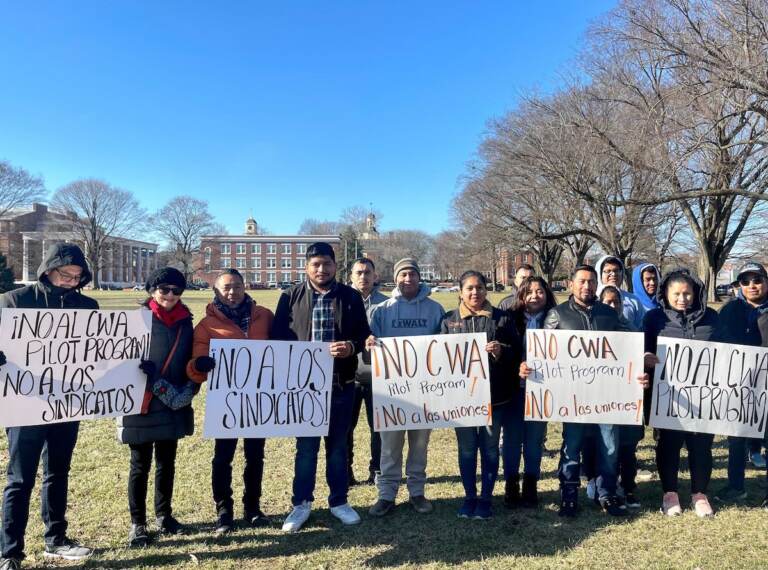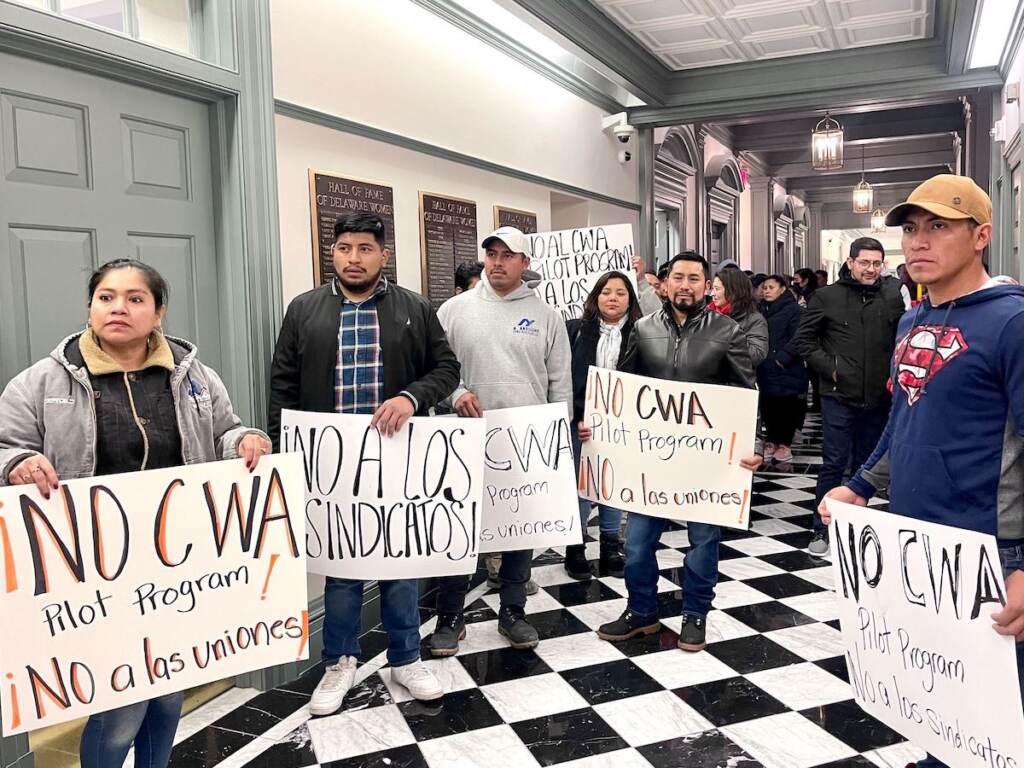Latino groups in Delaware protest pilot program they say would limit their ability to get state contracts
Latino leaders and business owners gathered at the Legislative Hall in Dover this week to oppose a measure they fear would harm their businesses.

The Latino community protesting outside Delawares Legislative Hall against the Community Workforce Agreement Act. (Johnny Perez-Gonzalez/WHYY)
With signs up in the air, Latino groups protested inside and outside Legislative Hall in Dover this week to protest against the Community Workforce Agreement Act.
The state Senate this week approved a pilot program that’s designed to improve diversity and inclusion on projects funded by the state. A similar effort last spring failed to get off the ground.
According to the 2022 Disparity Study of Delaware, there are significant gaps in the number of successful minority-owned, female-owned, and veteran-owned construction businesses, resulting in the usage of women or minority-owned businesses just 9% of the time.
“When we invest in Delaware’s infrastructure, we create jobs; when we create jobs, we want to be sure that Delawareans are the ones getting hired,” said bill sponsor Senator Jack Walsh, a Democrat representing Christiana and portions of Newark, Pike Creek, Stanton, and Newport. “At its core, a Community Workforce Agreement is a mechanism for expanding access to jobs and increasing the quality of those jobs — especially for underrepresented communities,” Walsh said in a written statement.

But despite the effort to improve diversity in the state contracting process,a group of Latino business owners and workers protested the move this week in Dover, claiming the measure would limit their ability to get contracts because it would require them to be connected to a labor union.
“We have a lot of women owning companies, cleaning companies, construction companies. It’s amazing how many women, how many Latinos own companies in the state of Delaware,” said Kevin Andrade, CEO of The Voice Radio Network. “As a Latino community, I don’t think we had the best experience working with the unions.” He said the pilot program would be a “disaster for the Latino community.”
At last week’s meeting of the Bond Bill Committee Republican Representative Michael Smith questioned the timing of the committee’s discussion of the bill. “I don’t like the fact that we’re having this meeting and we don’t have public comment. We’re giving 24 hours notice, this is just not the right way of doing business,” Smith said. “There’s lack of equity in the bill, too. We love to talk about equity in this building, but when it comes to specific things, if the equity doesnt fit in your conversation…. it doesn’t seem like it fits the narrative.”
Andrade was also concerned about the impact the pilot program on those workers who may not have proper documentation to be in the U.S. “The pilot program is encouraging that whoever is going to participate has to be a citizen of the United States. We know in these industries, a lot of people do not have the standard immigration status,” he said.
Since 2010, Sergio Morales of Longneck has closely worked with his brother, who runs a construction company. He recently made the decision to start his own construction business, E&S Morales Brothers LLC, which has been operating for three years. He said his business would be impacted by this initiative, limiting his opportunities for work.
“Las personas que tienen, o están empezando con un negocio pequeño, no van a poder escalar, no van a poder subir o no van a poder registrarse para poder trabajar con el estado o trabajos públicos”, dijo Sergio Morales.
“People who have, or are starting with a small business, are not going to be able to scale, they are not going to be able to go up or they are not going to be able to register to be able to work with the state or public works,” said Sergio Morales.
Every Latino has the ambition of owning their own business, Morales said, but with this program, they would be unable to compete. For company owners, competing in the market and particularly working with the government, represents a significant opportunity.
“Queremos una. Una tajada de pastel también”, dijo Morales.
“We want a slice of the cake too,” said Morales.
Despite the complaints, Walsh said implementation of this program has been successful elsewhere. “Neighboring states that have implemented CWAs have reported a range of successes from controlling construction costs, to ensuring fair wages and worker protections, to catalyzing the local workforce.”
The measure will now move to the House for consideration.

Saturdays just got more interesting.
WHYY is your source for fact-based, in-depth journalism and information. As a nonprofit organization, we rely on financial support from readers like you. Please give today.







